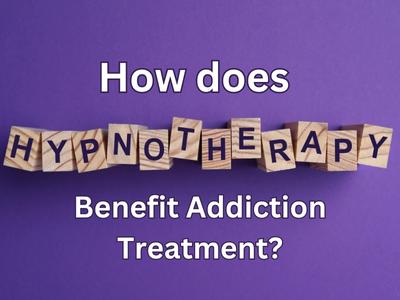When my therapist suggested trying hypnotherapy in my addiction treatment, I was both excited and skeptical. On the one hand, having my mind reprogrammed seemed like an attractive, effortless way of approaching addiction recovery. On the other hand, it surely could not be that easy.
The reality turned out to be a mixture of the two. Hypnotherapy can be very effective in addiction treatment. However, it looks nothing like we’ve been conditioned to expect. Addiction cannot be programmed out of you by magically accessing your subconscious. Hypnotherapy is a lot more subtle and is based on solid psychological therapy.

What is hypnotherapy?
One of the common factors in addiction is that substance use replaces healthy coping mechanisms. Often, the underlying reason is that an addict has strong narratives that make them feel unworthy, helpless, and undeserving. Traditional therapy often tries to meet these narratives head-on in an attempt to reframe them.
Unfortunately, because these narratives are so ingrained, simply breaking them down in conversation is a slog that sometimes gets nowhere. Hypnotherapy works by replacing the narratives on a subconscious level. Instead of trying to outthink or outlogic ideas that have been with you for decades, hypnotherapy hits them where they have taken hold.
In a hypnotherapy context, an addict will negotiate new narratives with their therapist – narratives that counter those that have gotten them stuck in the first place. The hypnotherapist then uses techniques to recite these narratives to the individual’s subconscious mind.
What Hypnosis Feels Like During Hypnotherapy
The experience of hypnosis can vary from person to person. However, there are some common sensations and feelings that individuals may experience while in a hypnotic state.
Deep Relaxation:
One of the common experiences of hypnosis is a state of focused attention and relaxation. When you enter a hypnotic state, you may feel mentally and physically relaxed and calm.
Increased Focus and Concentration:
When you are hypnotized, your attention is very focused. Your attention may be directed at the therapist’s voice or specific imagery or thoughts. Some people may describe this state as a feeling of intense focus, where other thoughts and distractions seem to fade away.
Increased Suggestibility:
Hypnosis is known for its ability to increase suggestibility. In this state, you may be more receptive to the positive suggestions and imagery that the hypnotherapist provides. You can use these suggestions to improve your self-confidence, reduce stress, or change your habits.
Detachment from Reality:
As hypnosis progresses, some people report that they begin to feel detached from the environment in which they are currently situated. A person may feel as if they are watching themselves from a distance or as if they are in a state of dreaming, depending on how they perceive it.
Overall, hypnosis during hypnotherapy is typically a pleasant and relaxing experience. It allows you to access your subconscious mind and explore and address underlying thoughts, emotions, and behaviors. However, it’s important to remember that everyone’s experience with hypnosis can differ. Some individuals may have unique sensations or interpretations during the process.
How does hypnotherapy benefit addiction treatment?

All addicts understand that their substance use is not entirely a choice. They can try to use their willpower to avoid substance use, but it is often clear that they will eventually lose this battle. The decision to use is made on a subconscious level.
Hypnotherapy is so useful in addiction treatment because it trains the mind to use alternative means of coping, as well as softening the effects of the narratives that are leading to substance use in the first place.
Think of it in a similar way to building physical strength. If you work on building a strong core, your body will defend itself against blows without you having to tell it to. You don’t have to consciously flex your abdominals when something is about to strike you in the stomach.
Hypnotherapy is like training for the mind. When you are confronted with a trigger, instead of having to think of how to react in a healthy way, your mind is already resilient. It is trained to dull the blow with your new, healthy narratives, rather than relying on substance use.
Hypnotherapy is an incredibly promising treatment for addiction. Substance use is not simply a choice to do the “wrong thing”, but is rather a maladaptive defense against emotional threats. Hypnotherapy trains the mind to be resilient and to stop relying on substance use to deal with difficult emotions.




